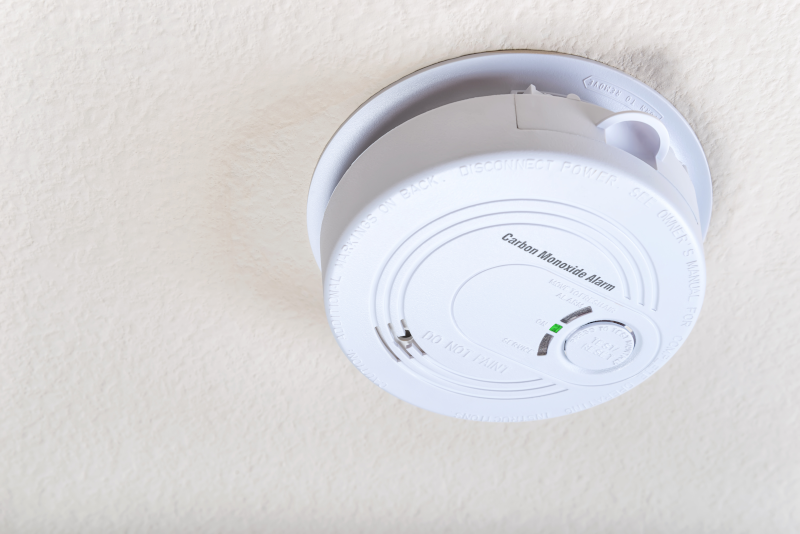Carbon Monoxide Detectors

09-16-2020
Not all the threats to your safety and security are from burglars or home invaders. In 2018 an estimated 387,000 residences caught fire. This is why you probably already have a smoke detector in your home. If you don’t, you should get one as soon as possible.
According to the US Center for Disease Control (CDC) 430 people die in the US each year from accidental Carbon Monoxide (CO) poisoning and another 50,000 visit emergency rooms each year due to accidental CO poisoning. For this reason, you should also have a CO detector in your home as part of an overall home security system.
What is Carbon Monoxide (CO)?
Carbon Monoxide is formed when things burn. It doesn’t matter what is burning, anything from firewood to natural gas, propane, gasoline, or paper will create CO. Commonly there are other particles and gases created when things burn, but CO is among the most deadly. CO is found in the exhaust of internal combustion engines. This is why you don’t want to breathe in exhaust fumes from a car, generator, pressure washer, lawnmower, motorcycle, chainsaw, or anything else with a gasoline engine. The same is true for natural gas or propane-powered devices such as a furnace, oven, stove, grill, lantern, or anything else. Charcoal grills, hibachi’s, and other cooking devices that burn any fuel are also sources of deadly CO gas. Electrically powered cooking devices do not produce CO unless you burn whatever it is you are cooking.
CO is a colorless odorless gas, so you won’t see it or smell it. Though, if you do smell something burning, then you can be pretty sure there’s some CO in the air, too.
In the body, CO will attach to red blood cells in the spot that’s supposed to be used to transport oxygen throughout the body. If you breathe in too much CO your body will not get enough oxygen and you may die.
Symptoms of CO poisoning
Common symptoms of CO poisoning are headache, dizziness, weakness, upset stomach, vomiting, chest pain, and confusion. If you or someone you know experiences these symptoms seek medical attention immediately.
Prevent CO Poisoning
Here are soem of the things you can do to prevent CO poisoning
Check Your Furnace and Hot Water Heater
If your furnace is not working correctly it may be filling your home with CO gas. Additionally, if your furnace is working fine, but the exhaust is not venting outside like it is supposed to, you could be setting yourself up for CO Poisoning. This is also true for your hot water heater.
Clean your Chimney and open the Flue
A nice fire in the fireplace on a cold winter night seems cozy, but if the chimney is blocked or the flue isn’t open you may be sending toxic gases into your home. Always check the flue and have your chimney cleaned once in a while.
Don’t Burn Stuff Indoors
This may seem obvious, but you’d be surprised how often people use a camping grill indoors, or in a tent without proper ventilation. Propane, butane, or gas-powered heaters, generators, and other devices should never be used in any confined spaces, including basements and garages. Even with the garage door opened, you are taking a risk running a gas-powered engine in your garage.
More Tips Direct From the CDC
- Never use a gas range or oven to heat a home.
- Never leave the motor running in a vehicle parked in an enclosed or partially enclosed space, such as a garage.
- Never run a generator, pressure washer, or any gasoline-powered engine inside a basement, garage, or other enclosed structure, even if the doors or windows are open, unless the equipment is professionally installed and vented. Keep vents and flues free of debris, especially if winds are high. Flying debris can block ventilation lines.
- Never run a motor vehicle, generator, pressure washer, or any gasoline-powered engine less than 20 feet from an open window, door, or vent where exhaust can vent into an enclosed area.
- Never use a charcoal grill, hibachi, lantern, or portable camping stove inside a home, tent, or camper.
- If conditions are too hot or too cold, seek shelter with friends or at a community shelter.
- If CO poisoning is suspected, consult a health care professional right away.
Get A CO Detector
The bottom line here is that you should have a CO detector in your home. Newer smoke detectors may have this built-in so that you don’t have to add another device and maintain it. In some cases, these can be connected to your home automation system and monitored by your Home Security System. If that sounds like something you want to add to your home. Please contact Affordable Home Security.
Vivint’s home security system is built for automation with advanced technology and modern equipment. This makes it the best customizable system on the list available.
Get a QuoteStart the new year right and protect your home and family with the best home security packages and equipment. We have no contracts, are easy to install and our equipment is backed by a 3-year warranty. Save 20% + Free Indoor Camera – Make 2020 safer, smarter and simpler by ordering a smart home security system plus get a free indoor camera for a limited time.
Get a QuoteHelping secure what matter most to you is our top priority. Backed with ADT's 24/7 monitoring, our home security systems are professionally installed to suit the needs of any lifestyle
Get a QuoteEvery home is different, and every homeowner has different needs. That's why we allow you to customize your security system to best suit your home. Get smart security, automation solutions and video surveillance access. Make low monthly payments with 0% interest when you finance. Call today to customize your package!
Get a Quote 844-326-6384
844-326-6384